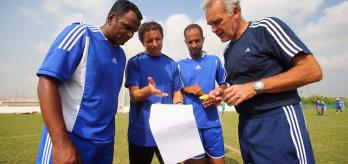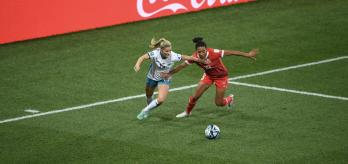The quantity and quality of an athlete's sleep are key for elite sports performance. There are now many studies on the importance of sleep, and this Science Explained session includes tips and strategies that practitioners can implement to help reduce factors that adversely affect sleep, allowing athletes to get a good night’s sleep consistently and ultimately leading to better performance. The session is followed by a Q&A, hosted by FIFA's Dr Paul Bradley.
To consider the importance of sleep and how it affects an athlete's performance, the benefits of sufficient sleep and the consequences of poor sleep, as well as ways to optimise sleep.
Typically, athletes do not get the recommended daily amount of 8 to 9 hours of sleep. Sleep deprivation can have many negative performance ramifications, but there are methods that can be used to optimise sleep. Coaches can help mitigate some of the issues around insufficient sleep.
Coaches and staff can help with player performance by scheduling activities in a way that does not impact sleep patterns, such as not having early morning training sessions. Players should not stay up late, learn how to deal with occasional changes, be aware of negative factors such as stress, alcohol, gaming, caffeine, and social media, and use technology wisely.
Watch video
Read summary
Part 1: Introduction
Halson introduces the subject of sleep and athletes, outlining that sleep is at the bottom of a recovery pyramid model. She notes that while nutrition and hydration are important, sleep and downtime form the foundation. If this foundation isn’t right, it’s a waste of time trying to work on factors in other parts of the pyramid. Halson recommends eight to nine hours of sleep a night. However, she observes that some of the recovery strategies used in football aren’t focused on sleep and are often based more around meditation on matchday. She says everyone recognises sleep is important, but people don’t know how to measure it and intervene.
Part 2: The importance of sleep
There has been a lot of research on the importance of sleep for the brain, mood, the immune system, metabolism and muscle, Halson says. Much of the research related to the brain is relevant to athletes, for example memory, decision-making, learning and reaction time. Sleep deprivation can also lead to illness and adversely affect recovery. Halson says athletes aren’t getting sufficient quality or quantity of sleep. Some of the reasons for this aren’t sports related. Early morning starts are not a good idea, Halson argues. Long-haul travel is also an issue, as are night-time competition, high training loads, and sleeping in unfamiliar environments: these can combine to create a ‘perfect storm’ for athletes’ sleep. However, these factors can be managed.
Part 3: The effect of sleep on performance and monitoring
Halson explains how sleep restriction, or cutting sleep short by a couple of hours a night, can lead to performance issues. If athletes get more sleep over a longer period of time, this leads to noticeable performance benefits. Halson outlines the different ways in which sleep can be monitored, and the amount and quality of data that can be obtained from each of the methods. Halson talks about the current trend for wearables and how the data obtained from them can be used. She also discusses how to design sleep studies, what data to collect, and what data should be given to players.
Part 4: Common sleep issues, strategies and tips
Athletes don’t typically get as much sleep as they need – on average 1.5 hours less. Consistent sleep is important, so athletes shouldn’t have a weekend schedule, for example. Early training also means less sleep, which affects performance. Caffeine affects both the amount of sleep and its quality. Workout supplements high in caffeine can adversely affect sleep when used in the afternoon. Halson says the only way to get over sleep deprivation is to get more sleep, i.e. to nap. The only time performance is negatively affected after a nap is if it is right before performance. Optimal nap times should be 20 to 90 minutes.
Part 5: Strategies and tips to optimise sleep
Athletes need to be given individualised information on sleep. It’s also important, Halson explains, to look at the sleep environment when away at events to optimise sleep for the athletes. She also gives five tips: a consistent bedtime and waking time; not staying up late; dealing with occasional changes; watching out for negative factors such as stress, alcohol, gaming, caffeine, social media, etc.; and using technology wisely to positively influence sleep.
Q&A
00:19
Could you provide a bit more granularity around some of sports-related factors that might impact or disturb sleep in various athletic populations?
03:23
Could you give us some things that staff and coaches could do to really help protect the sleep in the athletes they are working with?
05:17
There’s quite a lot of criticism in terms of the validity, reliability and sensitivity of some wearables. Could you give us some of the limitations and also strengths of wearables in relation to sleep?
07:25
Could you indicate how caffeine affects sleep, and also the magnitude of that effect?
09:47
What kind of guidelines would you give players around caffeine intake and ingestion? For example, you mentioned some athletes are sensitive to caffeine, what kind of information would you give those athletes?
11:23
You mentioned a really nice framework on sleep optimisation. Presenting a framework is one thing, implementing that practically is a different thing. How would you implement a framework like that with teams or even individual players?
12:55
I just wanted to touch upon the fantastic Women’s World Cup we’ve just had in Australia and New Zealand. Are there any female-specific sleep factors that we need to consider?
15:18
I also wanted to talk a bit about the multi-faceted nature of football. We know it’s a very physical sport, but it’s also a very cognitive sport. Could give us an insight into which components are affected the most: is it more the cognitive elements or the physical elements that are affected by lack of sleep?
17:19
Is there a relationship or association between sleep and injury risk, or even sleep and recovery time from injury during the rehab stages?
19:33
Could you provide any recommendations to ensure players get as much quality sleep as they can after a game?
21:37
You gave five tips in your presentation. Which one of them would probably have the most impact on teams and players?











